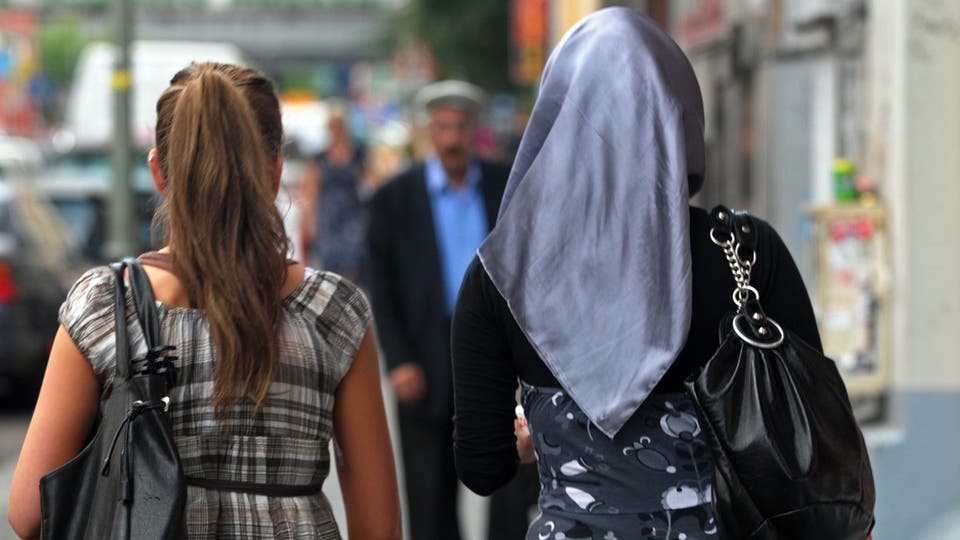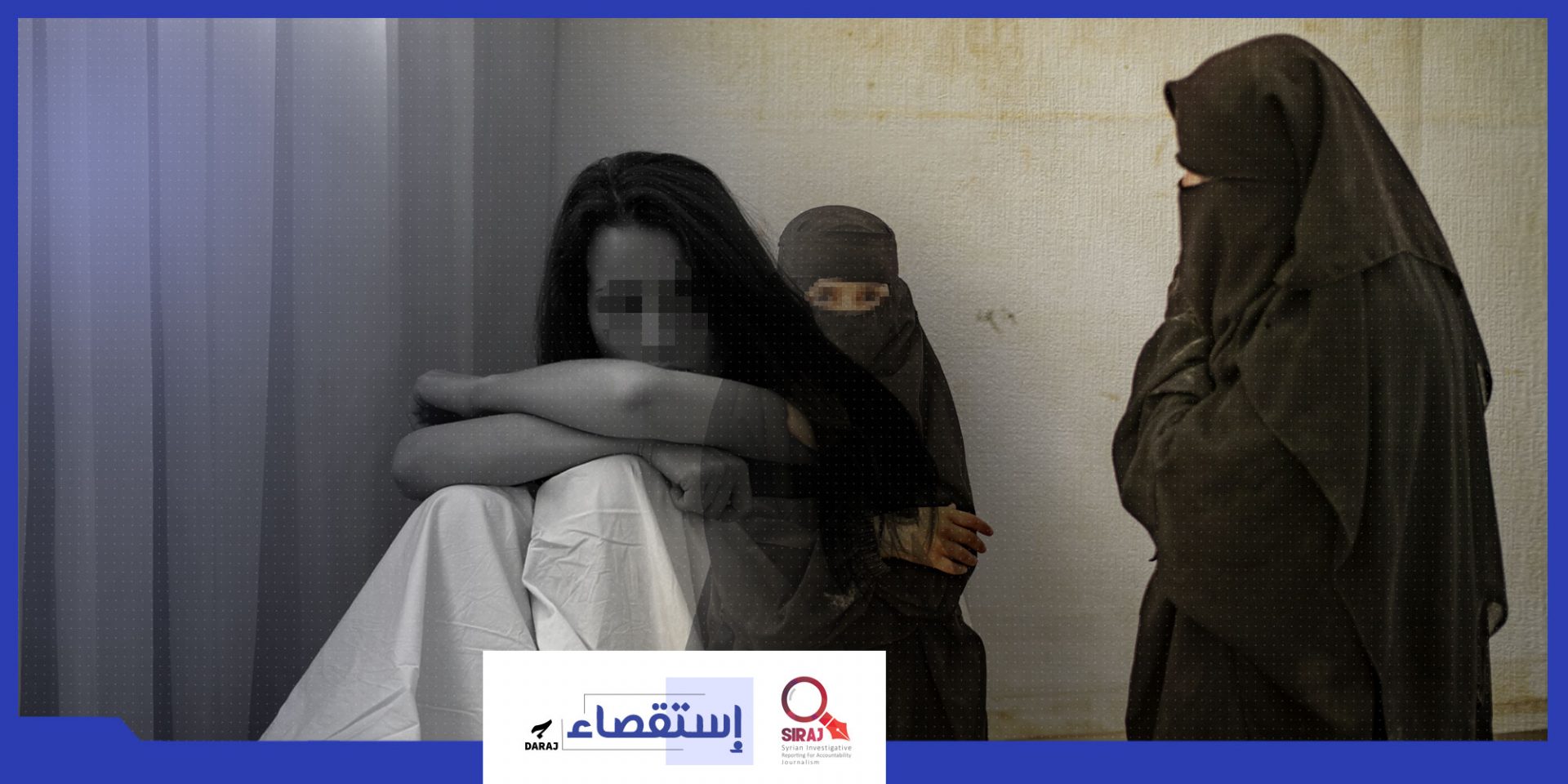This report documents the cases of mentally challenged Syrian girls who have been forced to have hysterectomy, for fear of pregnancy due to rape, or to avoid the troubles and pains of menstruation, which the girls are unable to deal with.
Fadwa, a Syrian lady, is taking care of her two sisters, Fatima and Reem, who suffer a genetic disorder called phenylketonuria, or PKU, which affects the skin and causes neural problems and growth deficiency, and is a result of consanguineous marriage.
The two sisters, Fatima who is 33 and Reem who is 30, have lost their parents years ago, so their sister Fadwa has become responsible for taking care of them. This mission was easier when they were young, but as they grow older, things have become more challenging.
“When Fatima and Reem reached adulthood, Fatima became irritable because of the sever menstrual pains she suffers during her period, while Reem is much calmer,” says Fadwa.
Fadwa consulted a gynecologist, who suggested injecting the girls with progesterone, in order to stop menstuation. Not only did the injection fail to achieve the desired effect, but it also created an undesirable effect. Fatima started to suffer the symptoms of menopause, like osteoporosis, skin wrinkles and weakness.
Fadwa heard of a surgical operation to remove the uterus, but she was shocked of this idea, and refused it. She explained, “I couldn’t bear the idea of making them undergo such a dangerous procedure and subject them to such panic. Moreover, they would have to be confined to bed for a long period after the operation”.
Although Fadwa refused to make her sisters undergo hysterectomy, many people agreed to such a dangerous procedure, which affects the patient both physically and psychologically.

This report documents the cases of mentally challenged Syrian girls who have been forced to have hysterectomy, for fear of pregnancy due to rape, or to avoid the troubles and pains of menstruation, which the girls are unable to deal with. The reported interviewed a surgeon who admitted performing hysterectomy on one of the girls, and a midwife who said she helped a mentally challenged girl who had been raped by 4 young men deliver her baby in southern Syria.
These operations are performed in secrecy, amid the lack of legislation that clearly defines the legal status of performing such procedures.
According to a study published by Medical News Today, hysterectomy is the second most prevalent surgical operation
Uterus Remover
At the beginning of 2019, a family asked the Syrian doctor Samira K., who works in a public medical facility, to remove their daughters uterus, because the girls suffers mental disability and is unable to take care of her personal hygiene or endure the pains of the menstrual period. She also wanders outside their home, which makes her family fear that she may be raped. The doctor refused to perform the operation, and suggested that the girl be given hormonal therapy to stop menstruation. She learned later that the girl unerwent the procedure at another surgeon’s office.
The gynecologist who treated the sisters Fatima and Reem says, “There are other options to relieve the pain of the girls during the menstrual period”. Therefore, he refuses performing such a procedure.
Dr. Ahmad S., who works at al-Suaida’ hospital in southern Syria shares the same opinion. He told us about a hysterectomy that was performed after he had refused to perform it. “A family came to me at the hospital requesting to have their daughter’s uters removed, as she was mentally challenged and they feared that she might be raped,” he said. “I refused to cooperate, so they took her to another doctor, who performed the hysterectomy in November 2018”.
We tried to confirm Dr. Ahmad’s story, so we visited the office of Dr. S. H., who is said to have performed the operation on the girl. We told him we had a mentally disabled sister on whom we want him to perform hysterectomy. He agreed to perform the operation immediately. When we asked him about the last time he performed such an operation to make sure it was successful, he admitted that he had performed the same operation on the girl Dr. Ahmad mentioned.
During the same meeting, the surgeon said that he usually “performs such operations on mentally challenged girls”. He declared that the operation costs 300 dollars in a private hospital, and that all the necessary analysis and medical procedures will be performed to ensure the girl’s safety.
We tried to contact the hospital where the procedure was performed to get the medical record, but the hospital’s administration refused to cooperate.
We tried to confirm the girl’s identity to make sure she was the same one Dr. Ahmad had refused to operate on. We asked the doctor to let us visit the girl’s family to make sure the operation was successful, and he approved. She was in her thirties, had down’s syndrome, and her family was grateful to the surgeon who helped them.
The girl’s mother said, “She used to have episodes of severe pain during her period, so we wanted to put an end to her suffering”.
Fear of Rape
Most families who have girls with special needs share the same fears. They fear that their daughters may become pregnant due to rape, so they resort to hysterectomy.
In 2003, the midwife Rima B. helped a girl, who had severe mental diability, deliver her baby. She got pregnant after being raped in the province of al-Suaida’.
“Four young men took turns to the girl,” said Rima. “They took advantage of her due to her mental condition, so the girl became pregnant. When the family later discovered what had happened, they tried to cover up the incident, and did not even try to file a complaint against the rapists for fear of scandal”. That incident took place 17 years ago.
It was later known that her parents kept her confined at home so that no one would know about what had happened, until the midwife delivered her baby at home. The same midwife tells us the story of another 17 year old girl whose parents feared that she might be raped, so they had her uterus surgically removed.
Syrian gynecologist Mona A. said that a mentally disabled girl visited her office after being raped by her brother in law. “The family asked me to end her pregnancy which was in the fifth week, and to cover the crime up. I suggested tubal ligation to stop her menstruation. The doctor said that her family’s attitude towards the issue made her unable to protect the girl, so she opted for preventing pregnancy instead of protecting the girl against rape. The girl’s family insisted to get an abortion and she lost contact with them.
Physical and Psychological Harm
A study issued by the British National Health Service (NHS) claims that hysterectomy is resorted to only when there is a danger threatening the woman’s life, only as the last solution.
The study specified several reasons that entail the performance of a hysterectomy, which are : Pelvic inflammatory disease, endometriosis, fibroma, cervical cancer or ovarian cancer.
The same study shows that inducing menopause through a surgical procedure causes several side effects, such as hot flashes, depression, dryness of the vagina, insomnia and sleep problems, fatigue, night sweating, osteoporosis, especially when the ovaries are removed at an age younger than 45, reduced libido, in addition to the fact that women who have their ovaries removed are 7 times more likely to suffer heart disease. Moreover, if those women do not receive hormone replacement therapy after removing the ovaries are likely to suffer cognitive problems, like dementia and Parkinson’s disease.
Doctor Ghada A. explained that there should be clear regulations in case the family requests hysterectomy, including informing them that there are other options, other than surgery, consulting a neurologist before the surgery, and assessing the girl’s health condition by a group of doctors and conducting the necessary analysis and scans, as well as informing them of the expected complications. She also affirmed that hysterectomy causes osteoporosis, in addition to stomach, colon and spine pains, in addition to the premature appearance of the symptoms of menopause.
The study issued by NHS classifies the complications of hysterectomy into early and delayed complications. The early complications include haemorrage, infection, injury of the bladder or intestines, and allergy or intolerance of anaesthetic.
As for the delayed complications of hysterectomy, they are a result of the deficiency of estrogen and other sex hormones secreted by the ovaries. This causes osteoporosis and increases the risk of heart disease and cognitive disorders. (dementia)
Court permission
A minor in Syria needs his parent’s approval to have surgical operation. This also includes people with mental disabilities. In the case of the father’s absence, the guardian is the religious court, and in case of need of surgery, the family requests the permission of the court.
Judge Yahia Al-Hoja says, “There is a permission needed to operate on a minor, or a mentally disabled person, because they are incompetent, regardless of the type of surgical procedure, as long as there is considerable danger.” He explains that the regulations compel the doctors to get a signed consent of the minor’s father, and in case of the father’s absence, the permission is requested of the court. Yet al-Hoja denied to have given such permission to hysterectomy cases, affirming that these surgeries are performed without permission of the court.
The primary religious judge in Damascus, Mahmoud Marawy, said that the court did not give permission to perform hysterectomy, indicating that the court only gives permission to perform surgery upon presenting a medical report that shows that the patient needs a surgery, and in case the father is absent, a guardian, such as the uncle, may be appointed.
When asked if he would give permission for a mentally challenged girl to have her uterus removed, for fear of rape that would lead to pregnancy, al-Maarrawy answered, “I’ve never thought of that before, it needs a lot of thinking.” He explained that the permission given by the court should be in the best interest of the minor. “I don’t think I would agree to that,” he added.
Maarrawi believes that parents should protect their daughter and provide her with care, through appointing a trustee—who is often a family member—to help her manage her affairs, and that a mentally challenged person is not supposed to walk alone in the streets. “I think the parents want to justify their negligence, carelessness, and perhaps other serious acts. Such a crime can be committed whether the uterus is in place or not.” He added, considering that hysterectomy in Syria is not a phenomenon.
What’s the legal definition?
The Syrian attorney, Fatima—a false name—affirms that there are reliable legal provisions that can be resorted to, in the event of causing bodily harm to those mentally challenged women. Moreover, Fatima confirms that there are international conventions on the rights of persons with disabilities, which Syria has signed and ratified. She stressed that through the conventions, the punishment can be applied to perpetrators against those with special needs.
The study found that the risk of developing depression, anxiety, future dementia, drug addiction and schizophrenia rises by 12% in those who undergo hysterectomy at the age of 18 – 35 years old
The attorney explains that “A mentally disabled woman has a trustee, who is a male and often her father, or her brother in case her father is absent,” noting that these are the trustees who give consent to the doctors to perform the operation, and thus the complainant and the criminal are the same exact person. However, she emphasized that anyone who knew about the occurrence of this operation could report it to the Public Prosecutor’s Office, bearing in mind that submitting a report differs from submitting a complaint, as the complaint must be submitted by the person concerned or his trustee.
The first paragraph of article 540 of the the general penal code in Syria states that: “Whosoever intentionally hits, injures or hurts a person and these acts do not result in the suspension of a person from work for more than 10 days, is to be punished— based on the complaint of the injured—by imprisonment for a maximum of six months or by preventive detention and a fine that ranges from 25 to 100 Syrian pounds (20-50 cents) or by one of these penalties.”
While article 541 stipulates that “In case the harm caused to the person prevented him or her from working for ten days, the perpetrator shall be sentenced to one year or less, and required to pay a fine of one hundred pounds at most, or one of these penalties. And if the complainant waives his civil right, the penalty shall be reduced by half.”
In this context, article 542 stipulates that: “If the suspension from work exceeds 20 days, the perpetrator is sentenced to three months’ to three years’ imprisonment, in addition to a fine of 100 Syrian pounds.” While article 543 stipulates that: “If the acts lead to cutting or removing a human body organ, or amputation or disabling a limb, disabling one of the senses, or causing serious deformation or any other permanent disability or having the appearance of permanent impairment, the perpetrator shall be punished by temporary hard labor for ten years at most.”
It should be noted that the penalty is doubled if the mentally handicapped, raped woman is a “minor”. In such a case, the penal code punishes the perpetrator with 15 years in prison with hard labor.
However, in the absence of a clear legal provision on the crime of hysterectomy for mentally challenged women, the penal code drops the crime based on article 1, paragraph 1, of Act 1 of the law which states that: “No penalty or precautionary or reform measure shall be imposed for an offense which was not mentioned by law when it was committed.” While the second paragraph of the same article states that: “The defendant’s acts shall not be taken into account as long as it was committed before being mentioned by the law.”
On an international level, Article 15 of the Convention on the Rights of Persons with Disabilities—ratified by Syria in 2007—stipulates that: “No one shall be subjected to torture or to cruel, inhuman or degrading treatment or punishment. In particular, no one shall be subjected without his or her free consent to medical or scientific experimentation.”
The same article specifies that: “States Parties shall take all effective legislative, administrative, judicial or other measures to prevent persons with disabilities—on an equal basis with others—from being subjected to torture or cruel, inhuman or degrading treatment or punishment.”
Two Religious Opinions
According to a study entitled “Hysterectomy in intellectually disabled women- a comparative doctrinal study,” conducted by Dr. Reem Mesbah Al-Qaryouti, and published in Jordan Journal of Islamic Studies in 2015, the Islamic Sharia has two opinions regarding hysterectomy operations; the first one forbids applying such operations on mentally handicapped women for many reasons, foremost among which is that hysterectomy represents an infringement of God’s creation and it subjects women to health risks as a result of undergoing surgeries without an urgent necessity. Moreover, this operation leaves the door wide open to corruption; as sick minded men find the mentally handicapped girls an easy prey and their transgressions will remain unsubstantiated. Another reason is that hysterectomy runs counter to the notion of “Preserving Human Dignity,” in addition to the physical damage caused by it. Furthermore, hysterectomy is incompatible with human rights if there is no intractable disease.
While the other opinion, as per the same study, permitted hysterectomy for several reasons, among them that this operation represents protection for the girl from the possibility of getting pregnant after being raped, in addition to easing her parents’ pain and relieving the pain that she experiences during her period. Finally, the main function of the uterus is to only hold a baby, and a mentally challenged woman can’t get married and thus it’s useless for her to have a uterus.
Psychological Impact
Researchers and doctors concluded that hysterectomy increases the risk of mental health disorders.
The research was conducted by a team of doctors, specialized in psychiatric and gynecological diseases in Mayo Clinic in the United States on September 5, 2019.
Shannon K. Laughlin Tommaso, Mayo Clinic’s managerial director, said that “a study that he conducted with a specialized team showed that women who undergo hysterectomy are more susceptible to depression and many psychiatric disorders.”
Dr. Tommaso pointed out that hysterectomy has several negative effects on mental and psychological health, especially if it occurs at an early age.
The study found that the risk of developing depression, anxiety, future dementia, drug addiction and schizophrenia rises by 12% in those who undergo hysterectomy at the age of 18 – 35 years old. It should be noted that researchers have been working on the study for two whole decades, and the study was conducted on more than 2,100 women who had undergone hysterectomy.
In addition to those psychological and physical impacts, these surgical operations run counter to the most basic principles of girls’ rights—by removing a body organ without their consent—as such operations put an end to the future of girls who could have had an opportunity to recover from mental disabilities and to lead a normal life.
*This report was produced with the support of “Open Media Hub”, funding from the European Union, and supervision from Ahmad Haj Hamdo- SIRAJ




